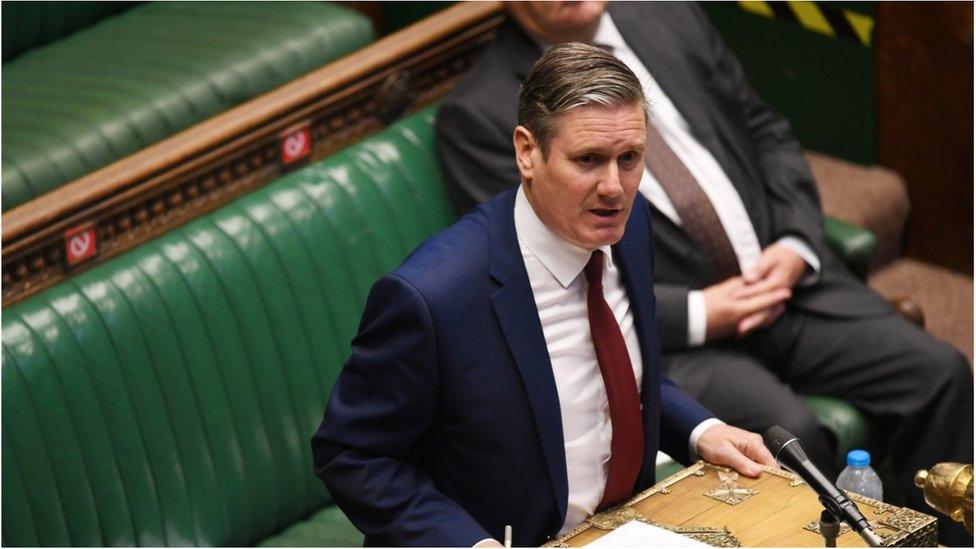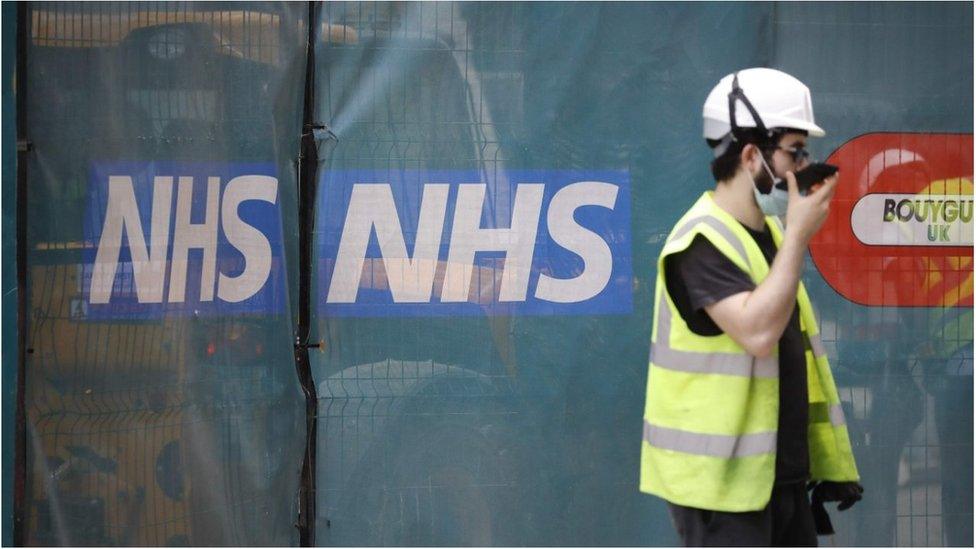Trade deal: Was this week's vote bad news for the NHS?
- Published

Labour leader Sir Keir Starmer tweeted on Thursday, external: "The Trump administration would like a trade deal with the UK to benefit America's big healthcare companies. That's why Labour tried to make it law that the NHS would be exempt from any future trade agreements. The Tories voted it down."
He attached to the tweet an article in the Guardian, external by shadow international trade secretary Emily Thornberry, with the headline: "The Tories' new trade bill means the NHS is now unquestionably up for sale."
Trade minister Greg Hands replied, external to Sir Keir's tweet saying: "This is just a barefaced lie by Starmer. He didn't show up for a single minute of 4 1/2 hours of debate on the Trade Bill on Monday, and it shows. The NHS is not & won't ever be part of UK trade deals."
So, what's going on?
'Roll-over agreements'
The government says that the trade bill, a new law that went before MPs on Monday, is about existing deals that the UK has with other countries via the European Union (EU) - and not about a future trade deal with the US.
Bernardine Adkins, a lawyer specialising in trade at Gowling law firm says: "The Trade Bill is concerned with the implementation of 'roll-over agreements', which are UK trade agreements with third countries with which the EU has existing trade agreements, to ensure continuity in trading relations."
But, while the powers the bill gave ministers did indeed only apply to roll-over agreements, the amendments (the extra bits that MPs wished to add) would have applied more widely.
The amendment to which Sir Keir was referring was summarised in the text, external as aiming "to protect the NHS and publicly-funded health and care services in other parts of the UK from any form of control from outside the UK".
It talked about maintaining a comprehensive health service free at the point of delivery, protecting the rights of health workers and regulating prices paid for drugs and medical devices.
There were also attempts to require all future trade deals to have a vote in Parliament, as well as requirements for maintaining food standards and environmental standards.
All were rejected in Parliament, which passed the bill but rejected the amendments.
The bill now has to go to the House of Lords (where another attempt to amend it could be made) before it becomes law.

Why are there concerns over the NHS?
Labour made the NHS a central part of its election campaign in 2019.
The then-Labour leader Jeremy Corbyn, brandishing leaked papers, claimed that the US would use a future trade deal to force the NHS to pay more for drugs from American pharmaceutical companies. At the moment, the NHS pays considerably less for those drugs than is paid by US healthcare providers.
Mr Corbyn claimed the extra cost would be £500m a week, although Reality Check examined that claim and found it to be an exaggeration.
President Trump said on a visit to the UK in June 2019 that the NHS would form part of negotiations, but later rowed back from that.
The government has repeatedly said that the NHS is exempt from trade agreements.
The Conservative Party manifesto at the 2019 election said: "When we are negotiating trade deals, the NHS will not be on the table. The price the NHS pays for drugs will not be on the table. The services the NHS provides will not be on the table."
But clearly Labour does not believe this. It was trying to use this trade bill to set rules and establish Parliament's role, in order to be ready for when the anticipated US deal is negotiated.
Parliamentary scrutiny
Concern has been expressed by opposition MPs about a lack of parliamentary scrutiny for future trade agreements.
"Because we haven't signed our own trade deals for a long time, we haven't had to think about what the process will be for passing them," said Maddy Thimont Jack, from the Institute for Government.
"The government has powers to pass some aspects of trade deals without there even needing to be a vote in Parliament.
"If you don't have something in law saying that you need to have a vote, then Parliament will likely be cut out of the process."
MPs were attempting to use this week's bill to clarify their role when it comes to scrutinising trade deals. There may not now be another trade bill in the immediate future which they can use to secure Parliament's role in the process.


